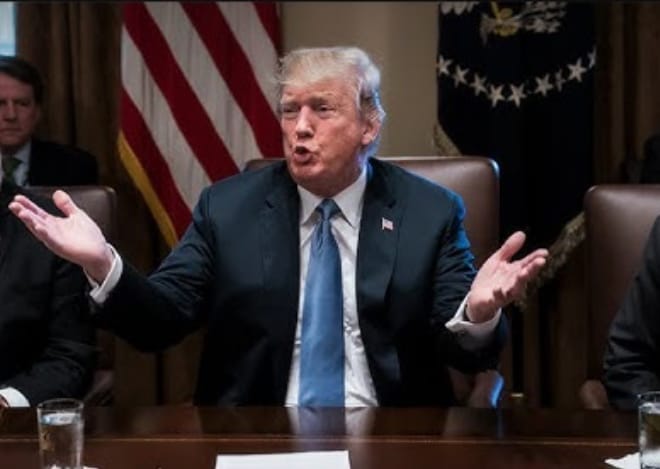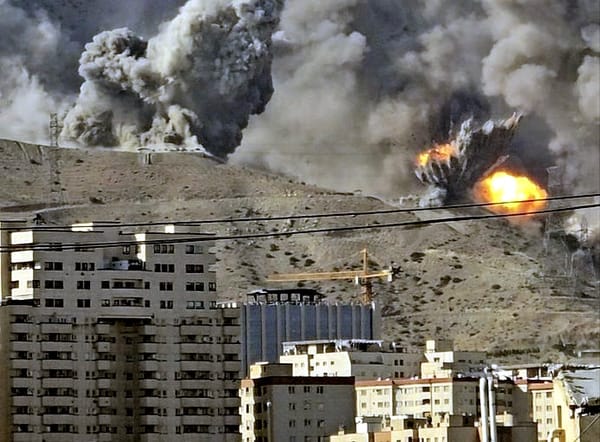Yep, Trump got rolled

An incompetent administration leaps without looking into a new phase of regional war
There was a brief moment last week when it looked like Donald Trump had come to his senses. After signaling that he was about to bomb Iran, he suddenly stepped back from the brink, indicating that he would take two weeks to decide. I thought it was strange that most people were chuckling at Trump the TACO ("Trump Always Chickens Out") – in this case, Trump backing down was good! Bombing Iran is bad! Taunting him for backing down makes it more likely that he will do it! I hoped against hope that Trump recognized that he had gotten rolled by Benjamin Netanyahu, who has been trying for more than twenty years to find an American president weak and stupid enough to manipulate into bombing Iran. Alas, it was all just a deception aimed at getting Iran to lower its defenses – just like the nuclear negotiations which Trump had deceptively scheduled for the weekend knowing full well that Israel was about to blow everything up.
There's a tremendous amount of commentary out there already, things are moving fast, and I don't have the time or the stamina to add to it all at this point. So just a few points. Yes, the US bombing of Iran was obviously illegal. For Trump that's clearly a positive rather than a negative. As with everything else he has done in his brief, blighted presidency, destroying the rule of law and crippling institutions is an objective, not a cost to be paid. This is a key place where Trump and Netanyahu's interests align: both want to institutionalize impunity for themselves (and only themselves). Trump wants a world (and a country) where no rules, laws, norms or insitutional constraints apply to him. Netanyahu wants to regionalize the Gaza rules, as we had already seen in Lebanon and Syria, consolidating the new reality that Israel has the right to bomb or occupy any target, anywhere. (Nobody should forget that Biden took the US down that same road by defending and enabling Israel's genocidal war in Gaza – on this at least Trump is not as exceptional as the commentariat wants us to think.) Both Israel and the US will almost certainly come to rue their embrace of might makes right as they reach the limits of their military capabilities and find themselves alone in a world without allies or sympathy – but neither Trump nor Netanyahu works within a time horizon where they expect to personally pay those costs.
Before the US attack on Iran, I had speculated to a reporter that Trump may try for a "one and done" attack – rolling the dice on destroying Fordow, and then whether the strike succeeded or not pausing to try to bring Iran back to the negotiating table where they would be forced to surrender. That definitely seems to be one of the scattered thoughts rolling around this administration's scattered brains. At the time, it seemed too clever by half: very little in Iran's history suggests that it would respond to a military attack by becoming more accommodating; quite the contrary; Trump clearly can not credibly commit to restraining Israeli attacks aimed at regime change and general infliction of death and destruction on Iranians; and this administration manifestly doesn't have the personnel or competence to carry off a complex bargaining sequence like that. The real question is what Plan B Trump will be sold on once this gambit fails. His administration doesn't seem to have a clue; its officials keep stressing that we are not at war with Iran and don't seek regime change while Trump keeps contradicting them.
What's likely to happen? The US bombing at this point doesn't seem to have accomplished its maximal goals. The Iranian regime is very unlikely to collapse under Israeli air strikes and internal subversion. Iranians are very unlikely to gratefully embrace Israel for bombing its cities and killing civilians. Iran is very unlikely to accept the unconditional surrender Trump demands. As much as he likes bombing things and being the center of media attention, Trump is very unlikely to go for an Iraq-style invasion and occupation of Iran. Israel will likely keep doing whatever it wants to do, confident that Trump can be manipulated into supporting it unconditionally but overconfident in its ability to translate military dominance into political or strategic goals. Iran's ability to retaliate has been degraded, especially with Hezbollah's weakened condition and its own diminishing missile stocks (and US assistance to Israel's missile defenses) – though probably not as completely as most currently assume. Iran has thus far chosen not to carry out its most potent options such as closing the Straits of Hormuz or lashing out at America's Gulf allies because it has, until now, preferred to maintain the positive relations of the last few years; I suspect that it may continue to hold its fire against the Gulf states for now, partly to keep them out of the fray and partly to maintain escalation potential.
All of this adds up to the likelihood of a sustained new normal over weeks and months of Israeli bombing of an ever-expanding range of civilian infrastructure targets, causing ever greater misery to Iranians without accomplishing Israel's (other) strategic goals. Iranian missile barrages will occasionally hit targets which cause Israelis pain but only increase support for Netanyahu's war, with a growing probability over time that one will get through the defenses or that Iran will successfully carry off some sort of nonconventional attack. Trump's bombs will likely turn out to barely an inflection in the Israel-Iran war rather than a game changer. And the region will continue to suffer. But no matter what happens in Iran, Trump's actions will likely have a much greater effect globally, as every other state in the world potentially targeted by the United States (which, under Trump, means basically anyone) draws the rational conclusion that it needs to get nuclear weapons as soon as possible and should never expect Washington to negotiate in good faith.
Stay tuned for regular MENA Academy roundups and reviews soon!



